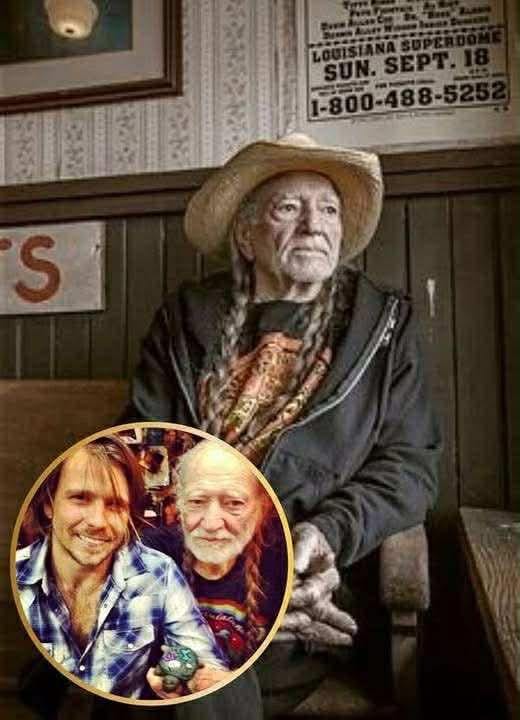Willie Nelson has long been seen as a living symbol of American culture — the braided hair, the weathered guitar, the easy smile hiding decades of hardship. Even at 91, he remains the outlaw poet of the open road, the man who turned drifting into freedom and heartache into philosophy. But behind the charm and the legend lies a life that was never simple. The road looked romantic from the outside, but Willie has finally admitted a deeper truth: he wasn’t always “on the road again” because he loved it. Many times, the highway was the only place he could escape the pain chasing him.
Born in 1933 in Abbott, Texas, Willie entered the world already missing stability. His mother left early. His father soon disappeared too. He and his sister, Bobbie, were raised by their grandparents — two hardworking, music-loving people who gave them the closest thing to home they ever had. But when Willie was just six, his grandfather died suddenly, and that fragile sense of security collapsed again. His grandmother did her best, but from then on, Willie grew up with a kind of emptiness most children never know. It shaped him. It pushed him. And it turned music into more than a passion — it became a way to survive.
He received his first guitar the same year his grandfather passed. It wasn’t expensive, but it was enough. Enough to distract him. Enough to steady him. Enough to let him pour his grief, anger, and confusion into something that made sense. By his teenage years, he was already writing songs that sounded like they came from someone twice his age.
Before fame, he tried everything. Cotton picking. Selling encyclopedias. A brief, unsuccessful stint in the Air Force. Barely-paid DJ jobs. He hustled constantly, chasing any chance to get closer to Nashville. When he finally broke through in the 1960s, it wasn’t as the Willie Nelson the world recognizes — it was as a songwriter. He wrote “Crazy” for Patsy Cline, one of the biggest country hits ever, and suddenly everyone wanted his words, though they weren’t ready for his voice yet.
Success didn’t bring peace. It didn’t quiet the restless part of him. And Nashville’s strict music system made things worse. Willie drank too much. He rushed into marriages — four in total. He burned through money the moment he earned it. Even when he returned to Texas and helped launch the Outlaw Country movement — the shift that made him a star — something inside him remained unsettled. People saw the freedom, the jokes, the weed, the charm. They didn’t see the nights he drank himself numb, or the way he toured endlessly like someone who couldn’t afford to stop.
The 1990s nearly broke him. The IRS hit him with a staggering tax bill — more than $16 million. They seized almost everything he owned: his ranch, his belongings, even his studio. Most people would have collapsed under the weight of it. Willie didn’t. He did the only thing he knew how to do: he hit the road. Concert after concert. City after city. Stage after stage. Not for glory, but to survive. He literally toured his way out of financial ruin, one show at a time, until he finally cleared the debt.
People romanticize touring, but the truth is harsher. The road is loud enough to drown fear. Busy enough to hide pain. Fast enough to outrun memories. Willie wasn’t running toward applause — he was running away from everything that hurt. He later admitted this openly. “On the Road Again” might sound joyful, but for him, it was also a confession: the road was where he didn’t have to sit still and face his past.
Even now, in the late years of his life, what defines him is resilience. His body carries the scars. His lungs have weathered decades of smoke. His bones move slower than the spirit inside him. Yet he refuses to fade quietly. When he fell ill last year and had to cancel a July 1st show, fans feared it might be the end. He’s 92 — recovery at that age is no small thing. But just days later, he walked onto a stage again, not to prove anything, but because Texas was drowning in devastating floods.
“This is for Texas,” he said, leaning on his son Lukas for support. No grand production. No spectacle. Just a frail man with a guitar, giving whatever strength he had left to those who needed help. Their voices cracked from emotion more than age. The set was short, but powerful — so powerful the crowd didn’t just clap. They stood and roared. For eight minutes. Many cried. Willie cried too. You could see in his eyes that this wasn’t a performance — it was a gift, maybe one of his last at that level.
Willie’s life has always been a blend of joy and pain, fame and struggle. And now, as he speaks more openly about his past, the truth becomes clearer. The outlaw image was real, but so was the hurt hidden behind it. He didn’t glide through nine decades untouched. He endured them. He survived them. And he did so without losing the warmth that made people love him.
The painful truth Willie Nelson is finally acknowledging isn’t that he’s nearing the end — everyone knows time is closing in. It’s that the legend people admire was built on a lifetime of struggles he rarely revealed. The road saved him, but it also wore him down. The fame lifted him, but sometimes buried him. He gave the world his voice, but the cost was far greater than most ever realized.
Now, at 91, he isn’t asking for sympathy or applause.
He’s simply telling the truth — and for the first time, people are truly listening.
